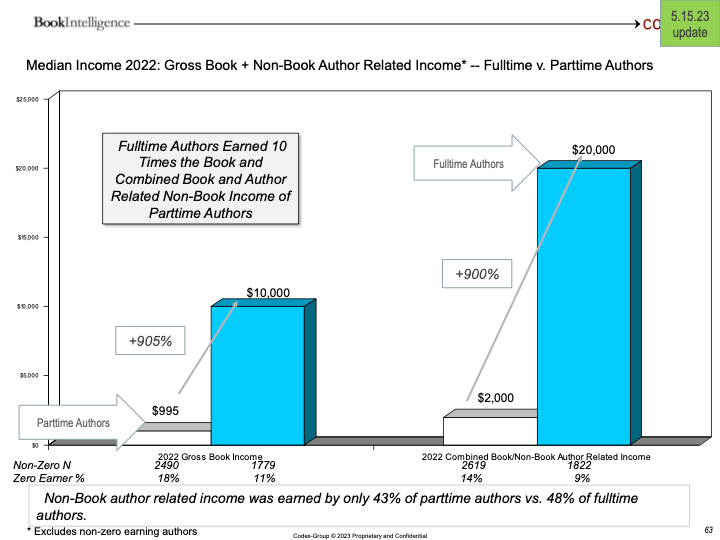Think Like a Publisher: The Secret to Making Writing Pay
When writing doesn't pay, think like a publisher, not like a writer.
If I had a dollar for every time someone told a writer to '“follow their passion,” I’d be sipping cocktails on my yacht. If I had another dollar for every writer struggling to sell their passion project, I'd own the marina.
Passion alone doesn’t pay the bills—but a publisher's mindset can. Let me show you how I am transforming my creative works into income producing assets.
And why is “yacht” spelled like that? Never mind.
Writing is a noble pursuit, and “Don’t sell out” and “Be true to your craft” is noble advice. But let’s be honest with ourselves: passion doesn’t pay the bills any more than Instagram followers or unpublished books.
Creativity, craft, and the best writing in the world won’t fund your retirement if no one reads your work. And “writing from the heart” may be satisfying, but it won’t put food on the table.
Unless… you learn to think like a publisher.
If you’ve been struggling to make money as a writer, the problem isn’t your talent—it’s your mindset. You’re thinking like a writer. Instead, think like a publisher.
I had that same writer’s mindset ailment (and lack of income). Let me show you how I now treat my publishing business to fix that.
You can fix it, too, but you have to really want to fix it. The sad reality is, many writers don’t want to fix it. If you do, you’ll need to first understand the problem.
The Problem: Why Writers Struggle to Make Money
Writers write for all sorts of reasons besides money:
To express themselves.
To communicate ideas.
To persuade, entertain, or enlighten.
Fun.
To finally get that “novel inside them” onto paper or into the cloud.
And that’s all great. But let’s talk truth:
Books don’t pay the bills. Most authors don’t sell enough copies to even cover their coffee budget, let alone their rent. With editors, cover designs, and marketing costs, a book that takes a year to write can take a full year or more just to break even. And that’s only if it does well.
Writing doesn’t scale. Unless you find a way to make your work work for you, you’re stuck on a hamster wheel. And I won’t even talk about the social media time suck.
Most writers trade time for money. They go by different names like freelancer, ghostwriter, blogger, but in the end, they all get paid per word, per hour, or per project. It’s a grind.
According to the Author’s Guild 2023 Author Income Survey:
This means half of all full-time authors continue to earn below minimum wage in many states from all their writing related work, and well below the federal minimum wage of just $7.25/hour from their books. It also tells us that most authors are earning half of their writing-related income from sources other than their books.
Writing for money is a blood sport says a Reddit commenter who states they’re an editor for a top 5 sci-fi and fantasy publisher.
Writing for money is a blood sport. The arena is littered with the bodies of those who never made it pay. Even skilled storytellers. Not just indies, but contracted authors whose books hit the top ten in their genre on Amazon.
The Problem with Passion Projects
Many writers treat writing strictly as a craft, a passion, or an art form. They’re sure that enough people will love their work without one shred of evidence to that effect. With no research of what readers want, they forge ahead. Even writers who want to make money from their work often have this perspective.
Writers often agonize over every word, chase unpaid “exposure” gigs, and think marketing is a dirty word. (Spoiler: it’s not.) Maybe they’re afraid of the rejection that a lack of sales would imply.
There’s this romantic ideal of writing the next great novel and not having to do any marketing. Reality, however, has other plans. Falling in love with your one big idea is a trap. Instead, building a large backlist and marketing it is a proven way to success long term.
When it comes to business, many writers are lost at sea. But, publishing is a business. To make money from your craft, you have to treat it that way. And that means getting your head in the right place.
The Solution: Adopt a Publisher’s Mindset
As we compare the mindset of the writer to that of the publisher, we see some stark contrasts.
The Writer’s Mindset
Focused on creativity and perfection.
Driven by passion and often crippled by fear of rejection.
Obsessed with “the craft” but averse to marketing.
Emotionally attached to the work.
Satisfaction comes from creating the work.
Example: You spend six months perfecting a short story, then let it gather dust in a folder because you’re terrified it’s not good enough. A year later, you hit publish, but don’t promote it.
The Publisher’s Mindset
Focused on market demand and audience needs.
Pragmatic about testing, iterating, and shipping work.
Treats writing as a product that needs to reach people to succeed.
Satisfaction comes from financial results.
Example: You release a series of short stories on Amazon, test different covers, and promote it through an email list and/or ads to see how it performs.
The Tension
The writer in you might dream of creating the next great novel. The publisher in you wants to get it out into the world to see if anyone else agrees. Fast.
Sometimes when I mention writing for an audience, that’s somehow seen as a bad thing. If you’re writing to communicate, it’s not only not a bad thing, it’s the only thing.
Unless you want to be the only one reading your work, you need to write for an audience bigger than just yourself (“be the niche” advice aside).
And, action > perfection.
If you’re stuck in writer mode, you’ll find it harder to make money. If you embrace publisher mode, you’ll learn, grow, and (finally) earn.
Time to Stop Trading Time for Money
Thinking of your writing as a one-off exchange of labor for cash is not going to cut it. Instead, start creating digital assets—pieces of work that keep earning for you long after you’ve written them.
Write books (in a series) that sell for years. (Not just a single launch.)
Create evergreen content. Blog posts, guides, or courses that stay relevant over time.
Build an email list. Turn your audience into a loyal fanbase.
Scale your work. Connect your assets to create an ecosystem that grows over time (develop a backlist, use your books to promote your email list and vice versa).
Benefits of Thinking Like a Publisher
When you adopt the publisher mindset, everything changes:
Every piece of writing becomes an asset. Instead of “just a story” or collection of facts or advice, it’s a product that can earn money, drive traffic, or grow your audience.
You’ll create a portfolio, not just a project. Publishers think in catalogs. One book is great, but only a start. Five books? Even better.
You’ll unlock leverage. Assets work for you 24/7—earning, attracting readers, and scaling your income while you sleep.
Practical Steps to Think Like a Publisher
We’re way beyond books and articles, here. Publishers build a portfolio of digital assets, then connect them together to create synergy and systems.
Ready to make the shift? Here’s how:
1. Generate Ideas Daily
Spend 10 minutes every day brainstorming.
Focus on one idea per day, but jot down anything else that comes to mind.
Over time, this habit builds a treasure trove of ideas for potential assets.
2. Create Digital Assets
Your writing should work harder than you do. As you build up your collection of ideas and notes, start turning them into published assets. These will set you up as an expert, help grow your audience, and bring in income.
Digital assets include:
Books (fiction, non-fiction, or even collections of blog posts).
Articles and Blog Posts (on your site or third party).
Guides and Reports (email series, downloadable).
Courses (in-depth knowledge transfer).
Newsletters (build, educate, entertain and nurture your audience).
Websites (create hubs for your content).
Video and Audio (multimedia assets across channels).
Images and Artwork (infographics, photography, digital art).
Templates and Frameworks (create assets that help you streamline).
Software and Tools (buy, borrow, or build).
Print Media and Printables (hardcovers, paperbacks, magazines).
POD Merch (niche or brand based).
3. Build Systems for Efficiency
Use templates, frameworks, and tools for common tasks (e.g., email campaigns, book formatting, editing, blog posts, newsletter issues).
Create workflows to streamline your writing, editing, and publishing.
Automate repetitive tasks.
Productize what you create. Free products earn goodwill, grow your email list, and build your brand. Paid products earn income.
5. Interconnect and Scale (Some call this marketing)
Link your books to your newsletter and your newsletter to your books.
Send emails to your list.
Use your website to promote courses, videos, or reports.
Mention your books on third party sites like Vocal or Medium.
Cross-promote your assets to maximize their reach.
Create reader magnets (lead magnets that attract readers) to grow your email list.
Run ads.
Common Objections: Addressing Resistance
Change is hard. Just about everyone I know of who has undergone this mindset shift has had to overcome their own resistance to it. That includes me.
You don’t have to do all these things, only enough of them. Below is some self-coaching help.
Objection: “I’m not good at marketing.”
Reframe: Marketing is storytelling. You’re a writer, right? You already know how to tell stories—you just need to tell them about your work.
Objection: “This will kill my creativity.”
Reframe: Systems and structure free up your brain to be more creative, not less.
Objection: “What if no one likes my work?”
Reframe: Everything is a work in progress. Feedback is how you improve. Publishers don’t fear criticism—they embrace it to make their products better.
What else do they do? They treat each asset like a stock in a portfolio.
Final Thoughts and Next Steps
If you want to make a living as a writer, it’s time to stop thinking like one. Start thinking like a publisher instead. Treat your writing as a business. Create assets, build systems, and scale your work.
As a writer, you have the tools you need to communicate with your audience. You only need make that slight shift in mindset to prevail. This mindset shift empowers writers to take control of their careers and their income.
Here’s your first step: pick one project, brainstorm how you can turn it into an asset, and plan its release with a publisher’s mindset.
Your writing deserves to be seen by the world. And you deserve to get paid for it.






Yacht, haha!
These are really helpful, especially creating systems. It's one of the best things to do to make everything easier so you are reinventing your strategies every few weeks. Thanks for gathering lots of helpful ideas into one place.
Great perspective on this Kurt. Already had a marketing aspect of it from being in sales and marketing in my past life, but going to prioritize this. Thanks for the reminder 🙏
And why do they spell “yacht” like that? 🤔